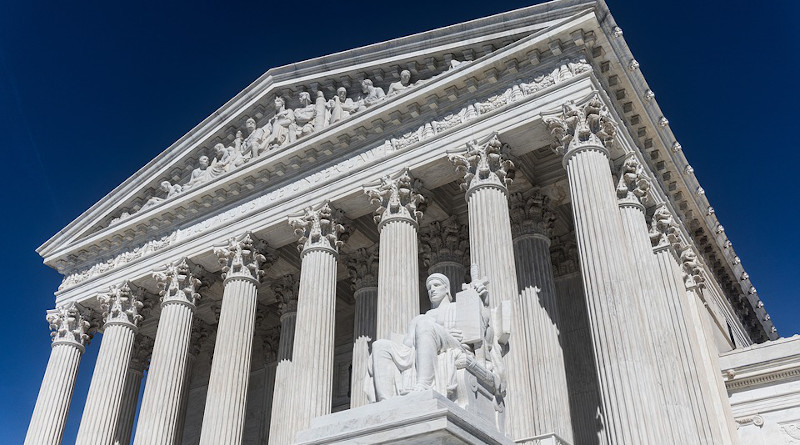Power, Not Principle, At Stake In US Supreme Court Fight – OpEd
By Arab News
By Dr. John C. Hulsman*
As the great American essayist, cynic and newspaperman H.L. Mencken put it: “When somebody says it’s not about the money, it’s about the money.” There is also a modern Washington version of this sage piece of advice: “When someone tells you it’s not about power, it’s about power.”
With the startling death of Ruth Bader Ginsburg, long the liberal bulwark of the US Supreme Court, both the Democrats and Republicans have gone into full self-serving, hypocritical mode, concealing from absolutely no one that, rather than being about high constitutional principle, the raging battle to fill her seat is instead about low political cunning.
One need only go back to February 2016 to make this entirely clear. Then, President Barack Obama, in the waning days of his eight years in power, put forward the eminently qualified jurist Merrick Garland to fill the late right-wing giant Antonin Scalia’s seat on the court. However, Senate Majority Leader Mitch McConnell, the ranking Republican in Washington at the time, refused to even schedule hearings to debate Garland’s fitness for the post.
Piously, McConnell “discovered” the new precedent — written nowhere in the constitution — that, with only eight months remaining in the Democrat Obama’s term, and with the Republican Senate fearful Garland’s pro-Obama leanings would decisively shift the court to the left as a whole, it was better to await the outcome of the November 2016 election to clarify this political logjam. Only after the people had their say, McConnell gravely intoned, could the court nomination move forward. Republicans were then for slowing down and awaiting the verdict of the people, while the Democrats were for moving ahead with Garland’s nomination, and quickly.
Now, hilariously, the two parties, just four years later, find themselves in diametrically opposed positions, with the Republicans racing to fill Ginsburg’s left-wing seat with a young right-wing jurist and the Democrats hewing to the go-slow McConnell line they so hated just four years ago. It is, indeed, about the power.
If anything, the Ginsburg replacement is even more important for the court’s general direction over the next generation. If President Donald Trump and McConnell succeed in filling the seat with a convinced conservative, the court will swing to a decisive 6-3 right-wing majority, potentially shaping much of American life for the coming generation.
Supreme Court justices are appointed for life, so this in-built conservative majority would have a massive say over workers’ rights, civil and women’s rights, the constitutionality of Obama’s health care law, abortion rights, environmental regulations, immigration issues, and tax regimes. Obviously, given this comprehensive list, it is easy to see why this unexpected court battle is being played for the highest stakes.
At present, it looks as though Trump and McConnell have the votes in the Senate to quickly push their nomination through. Republicans enjoy a 53-47 seat advantage, meaning they can lose three of their senators and still prevail, as Vice President Mike Pence, serving in his usually titular constitutional role as president of the Senate, can be counted on to vote with the majority party. Only two Republican senators, moderates Susan Collins of Maine and Lisa Murkowski of Alaska, have publicly announced their intention to defect. Most of the other usual suspects known for defecting from the Trump fold, such as Mitt Romney of Utah, have stayed within McConnell’s ranks. So this momentous sea change seems likely to happen.
As for the presidential election, the dramatic infusion of the nomination fight into the contest seems a wash to me. Trump and his supporters are happy to change the general conversation away from his publicly panned handling of the coronavirus pandemic, even as support for a third conservative court nominee in Trump’s four years will excite his evangelical, conservative base. Likewise, the Biden camp has used the super-charged atmosphere to raise yet more campaign money.
But, frankly, the electoral impact of the nomination seems overblown. According to detailed polling by the Pew Research Center, Supreme Court nominations were already “very important” to 70 percent of Republicans in 2016, and a still impressive 61 percent now. Likewise, 62 percent of Democrats felt them a vital voting issue in 2016, with a hefty 66 percent believing so in 2020. The issue was already crucial to both sides, so its new-found media prominence is unlikely to change much of anything.
For example, Pew went on to record in a July survey that fully eight in 10 white, evangelical Protestants who are registered voters are already planning to vote for Trump in any case. The Supreme Court narrative merely heightens the political trends on both sides that were already strongly established — Trump must be re-elected to safeguard the court’s rightward trajectory or he must be defeated to stop the court’s conservative drift in its tracks — it does not change the story.
So we come back to Mencken. The court nomination is not about the constitutional rights and wrongs of the question, nor is it about any immediate political advantage to be gained through the fight; in the end, it is about the awesome power the Supreme Court wields and the chance Republicans have to harness this power for the next generation.
- Dr. John C. Hulsman is the president and managing partner of John C. Hulsman Enterprises, a prominent global political risk consulting firm. He is also senior columnist for City AM, the newspaper of the City of London. He can be contacted via www.chartwellspeakers.com.

